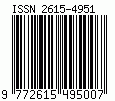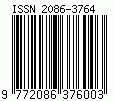LOCAL WISDOM is a scientific journal in the field of Architecture and the City as a "bridge" between the disciplines of architecture and urban planning and design studies. This scientific journal focusing on research relating to the study of local wisdom. Local knowledge is a potential local characteristic based on a local culture that has been a tradition in public life. A form of local wisdom studies varied widely, ranging from a cultural value system, social system to the physical manifestation of culture in the form of local knowledge, local technologies, as well as the physical form of the built environment. Studies of local wisdom is an effort in order to realize the harmony of the city environment, and sustainable through the use and development of local knowledge, contextual and a participatory approach. The scope of the study will be published in an article relating to the study of architecture (space, shape, and arrangement), a special area of study, and the study of urban planning and design. Local Wisdom of Journal published by the Center for Local Wisdom Studies, Department of Architecture, University of Merdeka Malang.
About the Journal
People
Submissions
Editorial Policies
- Focus and Scope
- Publication Frequency
- Privacy Statement
- Open Acces Policy
- Plagiarism Policy
- Copyright Notice
- Archiving
- Peer Review Process
- Publication Ethics
- Competing Interests
Journal Summary
Local Wisdom: Jurnal Ilmiah Kajian Kearifan Lokal is a scientific journal in the field of Architecture and the City as a "bridge" between the disciplines of architecture and urban planning and design studies. This scientific journal focuses on research relating to the study of local wisdom. Nowadays, it has been nationally accredited by the Ministry of Research, Technology, and Higher Education of Indonesia.
Accreditation

Local Wisdom: Jurnal Ilmiah Kajian Kearifan Lokal has been nationally accredited by the Ministry of Research, Technology, and Higher Education of Indonesia grade st2 (SINTA 2) by the letter number 164/E/KPT/2021 on December 27th, 2021, from Volume 13 Issue 1, 2021 to Volume 17 Issue 2, 2025.
ISSN Number
![]()
![]()
Local Wisdom: Jurnal Ilmiah Kajian Kearifan Lokal, with registered number ISSN 2086-3764 (print) | ISSN 2615-4951 (online) | DOI Prefix 10.26905 by crossref |
Focus and Scope

Local Wisdom: Jurnal Ilmiah Kajian Kearifan Lokal is a peer-reviewed, open access journal that aims to advance the understanding and practice of sustainability in the realms of management. This journal attempts to provide insights into the achievement of a local wisdom idea, through this idea and implementation; here, we focus on design and planning experiences at the levels of local cities and some urban areas in the world, particularly in Asian countries. Submission is expected from multidisciplinary viewpoints encompassing urban design, urban planning, land-use patterns, housing development, green design, and natural resources and ecological systems.
Publication Frequency

Local Wisdom: Jurnal Ilmiah Kajian Kearifan Lokal, has been published online since 2009 Local Wisdom of Journal published by the Center for Local Wisdom Studies, Department of Architecture, University of Merdeka Malang. Local Wisdom: Jurnal Ilmiah Kajian Kearifan Lokal is issued twice per volume, in January and July.
Privacy Statement
![]()
The names and email addresses entered in this journal site will be used exclusively for the stated purposes of this journal and will not be made available for any other purpose or to any other party.
Open Acces Policy
![]()
Local Wisdom: Jurnal Ilmiah Kajian Kearifan Lokal is loyal to open access to academic work. All the original articles and review papers published in this journal are free to access immediately from the date of publication. We don’t charge any fees for any reader to download articles. Local Wisdom: Jurnal Ilmiah Kajian Kearifan Lokal provides immediate open access to its content on the principle that making research freely available to the public supports a greater global exchange of knowledge.
Plagiarism Policy

In this publication, Local Wisdom: Jurnal Ilmiah Kajian Kearifan Lokal strongly opposes plagiarism because of its own abilities. Local Wisdom: Jurnal Ilmiah Kajian Kearifan Lokal is committed to blocking plagiarism, including self-plagiarism.
The author must ensure that the author has written the original work fully if the author has used the work and/or words of others who have been quoted correctly, and if found indications of plagiarism (above 25%) in the text, then Local Wisdom: Jurnal Ilmiah Kajian Kearifan Lokal automatically has the right to reject the manuscript. Local Wisdom: Jurnal Ilmiah Kajian Kearifan Lokal strongly recommends, too, an important part of the manuscript before it is published. The author also appreciates writing in Local Wisdom: Jurnal Ilmiah Kajian Kearifan Lokal about publications, duplicates, or excessive fraud.
Before the author submits the manuscript to Local Wisdom: Jurnal Ilmiah Kajian Kearifan Lokal at least to examine the use of plagiarism. When submitting articles published for authenticity checks, Local Wisdom: Jurnal Ilmiah Kajian Kearifan Lokal recommends the use of Turnitin, a Scanner from Turnitin. Before using Turnitin Plagiarism for the first time, we strongly recommend that the writer read the instructions for using this plagiarism detector. The plagiarism detection system forLocal Wisdom: Jurnal Ilmiah Kajian Kearifan Lokal uses and is affiliated with Turnitin.
* Please note that the Local Wisdom: Jurnal Ilmiah Kajian Kearifan Lokal is affiliated with Turnitin. *
The article has not been published in other media and does not contain plagiarism. Preferably the author must use reference management software, for example, Mendeley. Bibliography and reference system for Local Wisdom: Jurnal Ilmiah Kajian Kearifan Lokal using Mendeley.
Copyright Notice
Licensed
Creative Commons Attribution-NonCommercial-NoDerivatives 4.0 International.
Authors who publish in this journal agree to the following terms:
You are free to:
- Share — copy and redistribute the material in any medium or format
- The licensor cannot revoke these freedoms as long as you follow the license terms.
Under the following terms:
- Attribution — You must give appropriate credit , provide a link to the license, and indicate if changes were made . You may do so in any reasonable manner, but not in any way that suggests the licensor endorses you or your use.
- NonCommercial — You may not use the material for commercial purposes .
- NoDerivatives — If you remix, transform, or build upon the material, you may not distribute the modified material.
- No additional restrictions — You may not apply legal terms or technological measures that legally restrict others from doing anything the license permits.
Notices:
Archiving

Local Wisdom: Jurnal Ilmiah Kajian Kearifan Lokal utilizes the LOCKSS system to create a distributed archiving system among participating libraries and permits those libraries to create permanent archives of the journal for purposes of preservation and restoration. More...
Peer Review Process
![]()
Every article submitted to the editor will be received first by the staff editor then selected the selection editor for the next stage. the next stage through the Initial Review process by the selection Editor. The selection editor will continue the article to the reviewer stage and sent it to the editorial board and the executive editor will follow the next selection of the Review Process stage. After that, the article of the review process will be sent to the selection editor to be received or returned to the author for revision. This process takes a month for a maximum time. In each manuscript, the editorial board and peer reviewers will be assessed from substantial and technical aspects.
All submitted manuscripts are read by editorial staff. the manuscript evaluated by the editor becomes incompatible with journal criteria rejected immediately without any external reviews. The manuscript evaluated to be a potential interest for our readers is sent to two reviewer desks. The editor then makes a decision based on reviewers' recommendations of several possibilities: rejected, revision required, or accepted. The editor has the right to decide which manuscripts submitted to the journal should be published.
Review Process:
- The author submits the script
- Editor's Evaluation (some manuscripts denied or returned before the review process)
- Double-blind peer review process
- Editor's Decision
- Confirm to an author
Publication Ethics
Our ethic statements are based on COPE’s Best Practice Guidelines for Local Wisdom: Jurnal Ilmiah Kajian Kearifan Lokal.

Multiple, Redundant, or Concurrent Publication
Authorship should be limited to those who have made a significant contribution to the conception, design, execution, or interpretation of the reported study. All those who have made significant contributions should be listed as co-authors. Where there are others who have participated in certain substantive aspects of the research project, they should be acknowledged or listed as contributors.
Competing Interest Guidelines
In the interests of transparency and to help readers form their own judgements of potential bias, Local Wisdom: Jurnal Ilmiah Kajian Kearifan Lokal' require reviewers (in the process of peer review) and authors (in the Author Declaration) to declare any competing financial and/or non-financial interests in relation to the work described. The corresponding author is responsible for submitting a competing interests' statement on behalf of all authors of the paper.
Definition
For the purposes of this policy, competing interests are defined as financial and non-financial interests that could directly undermine, or be perceived to undermine the objectivity, integrity and value of a publication, through a potential influence on the judgements and actions of authors with regard to objective data presentation, analysis and interpretation.
Financial competing interests
Financial competing interests include (but are not limited to):
- Receiving reimbursements, fees, funding, or salary from an organization that may in any way gain or lose financially from the publication of the article, either now or in the future.
- Holding stocks or shares in an organization that may in any way gain or lose financially from the publication of the article, either now or in the future.
- Holding, or currently applying for, patents relating to the content of the manuscript.
- Receiving reimbursements, fees, funding, or salary from an organization that holds or has applied for patents relating to the content of the manuscript.
Non-financial competing interests
Non-financial competing interests include (but are not limited to) political, personal, religious, ideological, academic, and intellectual competing interests.
Example competing interest statements:
I/We have no known competing financial interests or personal relationships that could have appeared to influence the work reported in this paper.
Author Fees

This journal does not charge authors any fees.
We do not want fees to prevent the publication of worthy work.













